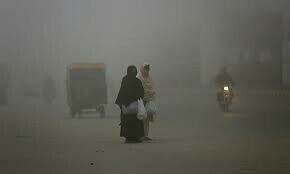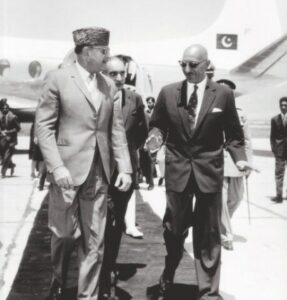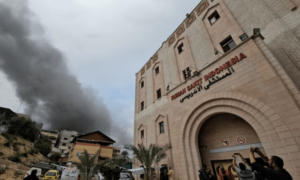LAHORE: The provincial metropolis on Monday continued witnessing hazardous air quality levels and stood the most polluted city of the world touching the mark 708 of Air Quality Index (AQI).
The lowest AQI in the city was from 4pm to 5pm at 246 which was still very unhealthy while the maximum, 708, was reported at 11pm when this report was filed. The PM2.5 concentration was 431µg/m³, 86.2 times the WHO annual air quality guideline value. Lahore, yet again, topped the world map in the list of most polluted cities of the world. New Delhi followed it with AQI 232 at 11pm while its maximum was 271 at 6am.
The AQI at CERP office in Gulberg was shocking 953, followed by 810 at Pakistan Engineering Services Ltd and 784 at Syed Maratab Ali Road.
The experts and academics are challenging the government data about the main contributors of smog, including vehicles and stubble burning, arguing that one could observe smog around Lahore even in June travelling on M2 and what would be the cause of smog in summers. They say the government should take measures to properly provide data and educate the public about the negative impact of smog on public health.
Govt, activists differ on AQI data; very few public sector monitors functional
Talking about the smog situation in Lahore, Environment Protection and Culture Change Department (EPCCD) secretary Raja Jahangir Anwar said there were several causes of the smog, including vehicular smoke, stubble burning, factories emission and brick kiln operations. He said the AQI data was being taken from private and low-cost censors and it could not be called authentic.
Replying to a query about the causes of smog, he pointed out lack of scientific research. Three studies not on scientific basis were conducted in Pakistan including Ministry of Climate Change, Food and Agriculture Organisation and Urban Unit.
He said that these three studies had mentioned different major causes of the smog. One study claimed that the vehicles were causing 40pc, second 60pc and third 80pc. He said 4.5m motorcycles, 1.3m cars and trucks, 6,800 factories, 1,200 brick kilns were operating in and around the city and the stubble burning was also taking place in Kasur, Sheikhupura, Nankana and Gujranwala.
“The government has three functional air quality monitors installed in Gulberg, Mall Road and Punjab University and eight more would be installed by Nov 10 and the number would reach to 16 after five mobile van air quality monitors would also be installed this year. A central control room has been established and the air quality report is released on a daily basis from the station.”
Mr Anwar said that a scientific study was also being conducted with Suparco to provide genuine reports to the public.
“The air quality changes with time. It has been observed that the city reaches hazardous levels from 11pm to 5am. The air quality worsens as the heavy vehicles carrying construction material, sand and cement often operate at night. The city is also expanding and construction business of housing and establishing new plazas are booming and also affect the air quality. The wind from eastern Punjab in India also increases smog in Lahore,” he said.
Meanwhile, the Punjab government constituted an 11-members committee to find the mechanism to enhance the credibility of AQI reporting from different sources and facilitate its effective propagation to stakeholders.
Representatives from Environment Protection Agency (EPA), PITB, Urban Unit, Centre for Environmental Protection Studies, Pakistan Council of Scientific and Industrial Research (PCSIR), LUMS, Punjab University College of Earth and Environmental Sciences, UET, Chief Pakistan Meteorological Department and Suparco are its members.
The committee would review the AQI and report a mechanism to overcome inconsistencies in AQI data to examine the available technologies and their suitability and suggest a legal framework for reporting of accurate and reliable AQI data through a single platform.
Senior Minister Marriyum Aurangzeb has issued an emergency alert for citizens in Lahore due to the rising levels of smog and has appealed for the implementation of safety measures. Citizens are advised to wear masks and keep windows and doors closed to avoid exposure to pollution.
She urged the citizens, particularly children, the elderly and individuals with heart and respiratory conditions to avoid going outdoors. She said that smoke-emitting vehicles will be seized and no brick kiln would operate without zigzag technology and action was being taken against the farmers involved in burning crop stubble.
Published in Dawn, October 29th, 2024







